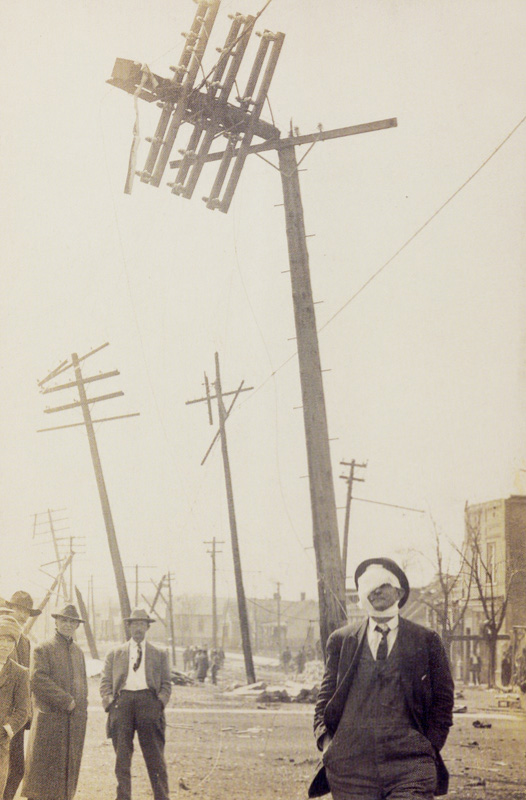
USA, c. 1925, photographer unknown; collection of Thomas Walther
There is considerable interest now in photographs that dwell not on the moment when something destructive occurs but on the aftermath. A recent exhibition, Conflict, Time, Photography at Tate Modern in London, gathered pictures taken hours, days, and years later when peace has returned to the troubled location, and traces of fighting or explosions linger, like weathered scars, as evidence and reminders.
What calamity has unfolded so recently in this small American town? In other times or places, this degree of damage might be a sign of war. Here, it can only be the outcome of extreme weather: a hurricane or tornado. The image first appeared in Other Pictures (2000), a set of anonymous photos selected with an acute eye for aleatory perfection by the photography collector Thomas Walther. The book was one of the earliest to focus on the found photograph and it may still be the best. In 2013, the picture surfaced again, with attribution to Walther, in Found Photography, published in Thames & Hudson’s Photofile series.
It might be revealing to know where and how Walther acquired it. Other Pictures records only the country—no town or state—and probable year, circa 1925. Because the photographer is unknown it’s impossible to determine whether this is a fortuitous shot, in which every detail gelled by accident, or the work of someone fully conversant with the medium, though experience seems more likely. The picture taker channels the uncanny drama of the scene flawlessly, aligning the bystanders’ heads with the buildings in a horizontal band at the base of the broken utility poles that fracture the pale and cloudless sky. The collapsing cross bars loom above the townsfolk like ideograms of disaster written in the air.
It would be a memorable picture even if the man didn’t have a bandaged head. The presence of the curious but entirely apt bulky white dressing lifts it to a higher level. Undaunted by apparently serious injury and still wearing his hat, he stands apart from the others, out at the front, with the air of being in charge. The photographer connects him to the main pole, which has also sustained a bashing at its summit, and even his tie, pulled out of place by whatever befell him in the turbulence, is a small echo of its angular structure. The men in the secondary group have their own listing vertical counterparts behind them. It’s a scene that documents the resilience of a community and its pride in a kind of ownership: this was a challenge they shared and together they surmounted it.
